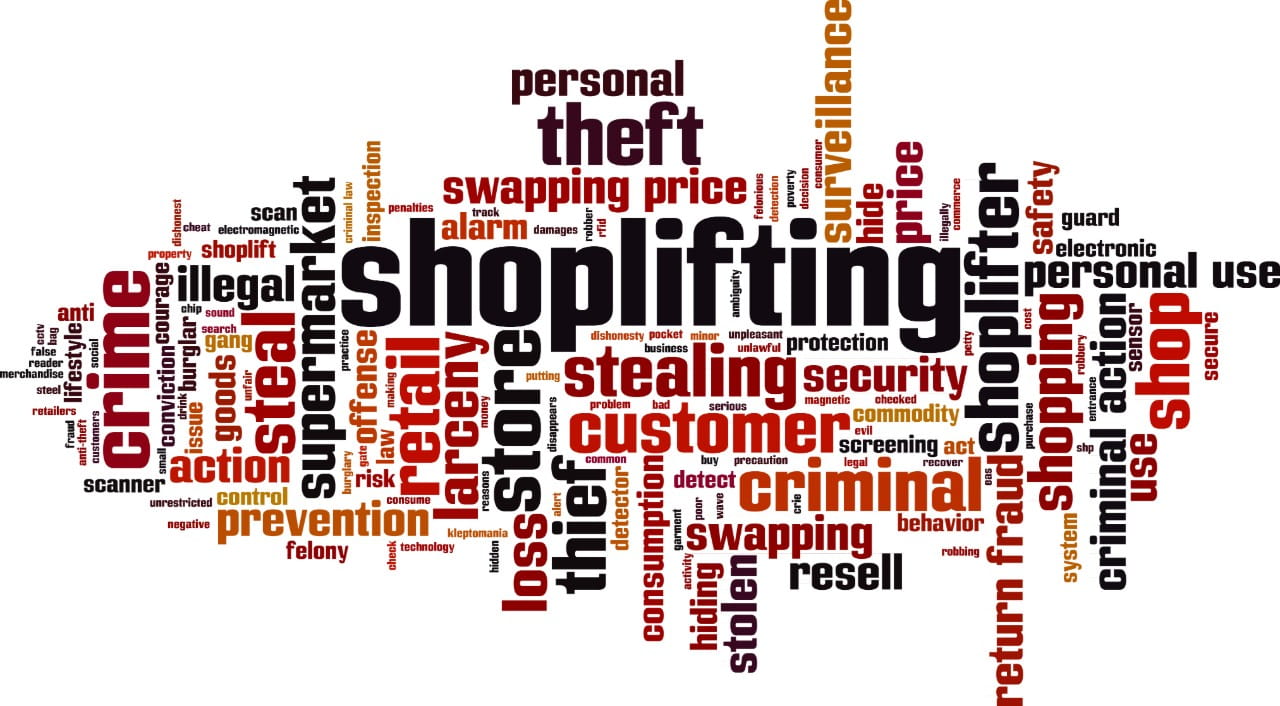- Home
- Practice Areas
Let Us Help With Clearly Defined Defense Strategy
- Attorneys
- Resources
- Contact

If you’ve been charged with shoplifting in Arizona, unfortunately you’re looking at a crime that has consequences both in court and out of court. Whether you’ve been charged with a felony or misdemeanor, a conviction can mean jail time and will wreak havoc by implicating professional licensing, your immigration status, background checks, job opportunities and security clearances. Having the facts of your case evaluated by a trained shoplifting lawyer will provide you the best opportunity to avoid a conviction and the future collateral consequences.
Removing any of the goods from the immediate display and leaving without paying the purchase price; or
Charging the purchase price of the goods to a fake person or to another person without that person’s consent; or
Paying less than the purchase price of the goods by some trick or artifice such as altering, removing, substituting or otherwise disfiguring any label, price tag or marking; or
Transferring the goods from one container to another; or
Concealing the items.
Pursuant to ARS 13 1805 shoplifting merchandise with a value of less than $1,000 is a class 1 misdemeanor in Arizona unless:
A violation of any of the provisions above is considered felony shoplifting in Arizona.
The penalty for shoplifting as a misdemeanor can range dramatically based on the facts of your case, the prosecuting agency, what store the items were stolen from and your judge. That said, a misdemeanor shoplifting first offense can normally be handled quite easily. For the best evaluation of the penalties you are likely to face, contact an experienced shoplifting lawyer in Arizona.
SIDE NOTE: Diversion or deferred prosecution agreements are common in many instances and allow for your case to be dismissed.
Pursuant to ARS 13 1805, shoplifting as a felony occurs when a shoplifting misdemeanor occurs AND:
The maximum and minimum punishment that you can expect after a conviction for felony shoplift in Arizona depends on the type or felony for which you are convicted. That said, the penalty for shoplifting can range drastically but speaking to an experienced shoplifting lawyer can provide you a better gauge of possible penalties under the facts of you specific case.
Known James hearings because they derive from a Supreme Court case called U.S. v James, theses are special hearings that take place prior to a jury trial. Used effectively, the defense may limit the number of recorded statements that can be used against a client if there is a finding that the statements where not made in furtherance of the crime.
In addition to any penalties you may face from the courts, there are often other penalties that many people must confront. Arizona shoplifting charges have substantial collateral consequences because they are known as a “crime involving moral turpitude (CIMT).” This legal categorization means that the crime is generally considered depraved or immoral. A conviction for a CIMT offense can have consequences even greater than those some suffer through the criminal court system. Other penalties pursuant to a collateral theory include:
Doctors, lawyers, accountants, those licensed to sell securities, insurance and annuities will have to report any conviction of a theft crime. Some licenses even require that the professional report having been charged with the crime, even if the crime is later dismissed. Because the crime is a CIMT, many professionals are required to report to licensing boards, charges and convictions for crimes that constitute legally immoral behavior.
As discussed above, shoplifting carries a CIMT distinction and create problems in immigration. Under 8 U.S.C. § 1251(a)(2)(a)(i), convictions for theft are normally a deportable offense depending on the applicant, the time frame and the exact crime for which you are found guilty.
Many major corporations, including major retailers, won’t even let you operate a cash register if you’ve been convicted of a theft crime.
Government clearance needed for certain government positions as well as employers that contract work with the state and federal agencies generally require a crime-free background.
A conviction can result in the suspension of your DPS fingerprint card. However, a good cause exception may be available.
Many lenders are unwilling to lend to those convicted of certain theft crimes. A conviction for felony shoplifting will normally have to be reported on a mortgage application, student loan affidavit and all Small Business Association loans which will normally result in denial of the application for the prescribed period.

Developing a shoplifting defense strategy is paramount to getting your case dismissed or reduced. The defenses that you may want to raise will depend on the specific facts of your case. However, some of the more common defenses include:
This involves attacking the quality of the police’s investigation and the reliability of the evidence used against you. Your attorney should consider attacking what evidence was preserved and not preserved, the quality of the witnesses, the witness statements, the valuation of the items or services allegedly stolen, as well as the quality of the police reports and record keeping.
In Arizona shoplifting cases, the prosecution must prove that concealed of left the store with the “intent” of not paying or keeping the items. Attacking the ability to prove your knowledge, motive and mental state can help to reduce or dismiss charges.
If you are charged with a crime on the basis of eyewitness identification, then you will want to look into attacking the eyewitness’s testimony. Eyewitness testimony has been shown to be one of the most unreliable types of evidence. Other times, suggestive photo lineups and mistaken identification in video leads to wrongful arrests.
If you were simply at a store when a crime was being committed, then you may want to raise a mere presence defense. If you were merely present at the crime scene, then you did not have any criminal intent and did not take part in the crime.
Your attorney may also raise defenses by way of Constitutional legal challenges including: Miranda Violations, illegal search and seizure violations and right to counsel violations.
Because the Arizona shoplifting definition requires that the prosecution prove a specific dollar amount, you can often be successful in arguing a reduced value of the item or service stolen.
Diversion agreements, or deferred prosecution agreements are plea agreements that allow your case to be dismissed after you have successfully completed some type of requirement such as repaying the value of the item, attending a shoplifting class or completing community service.
For misdemeanor Arizona shoplifting charges, there is a way for a person to engage in a civil compromise. Although often left unexplored, a misdemeanor compromise pursuant to A.R.S. § 13-3981 is an excellent way to avoid jail time, reduce fines and have your case dismissed.
Example. You are accused of stealing a pack of gum from a pharmacy. If the corporation agrees, you can simply pay money for the pack of gum in exchange for the criminal case being dismissed. It is important to note, however, when you have been accused of a crime, you are generally forbidden from making contact with the victim (store). As such, misdemeanor compromises must be handled by an experienced shoplifting lawyer, judges or the victim advocate. Simply contacting the victim and asking to buy our way out of a crime may constitute witness tampering.
At Feldman and Royle, we understand that every case is different. We are a team of defense attorneys with experience handling both felony and misdemeanor theft cases. Please contact us for a free initial consultation in order to further discuss the circumstances of your case and find out how we can help you.

When you receive a citation after an arrest, you are being cited into court to stand charges. Under the law, these are criminal charges and carry with them the possibility of fines, probation and jail.
The statute of limitations is (1) one year for a misdemeanor and (7) seven years for a felony.
The shoplifting definition is a theft of merchandise from a store during the hours of operation.
Shoplifting is a crime regardless of the offender’s age. That said, when someone is arrested and they are under 18, the charges will normally be handled by the juvenile courts. Commonly, however, when the offender is 17, law enforcement will wait to file charges against a juvenile offender until they turn 18 in which case, the charges will be handled by the adult criminal courts.
The punishment for a first time offense can range dramatically based on the facts of the case and whether the offense is a felony or misdemeanor. That said, an experienced shoplifting lawyer can often negotiate for reduced or dismissed charges when the offense is for a first time allegation.
Being caught at Walmart is no different than being caught at any other store as it relates to the charges you will face under the law. That said, Walmart notoriously prosecutes theft charges aggressively and will normally have store surveillance to provide to the police in an effort to strengthen their case against you.
Being caught on camera does not change the nature of the charges. However, having a theft recorded on video will normally strengthen the case against an offender and make defending the charges more difficult.
Unfortunately, criminal convictions stay on your record for life in Arizona. After a conviction the best thing that can be done is having the conviction set aside which is Arizona’s version of expungement.
In essence, shoplifting is a theft. The difference is that shoplifting is a theft from a store where merchandise is displayed for sale.
DISCLAIMER: The material found on this website is intended solely for informational purposes. Nothing on this website is intended to constitute legal advice specific to any individual or case. No information provided, e-mail inquiry generated, or reply from our firm through this website establishes an attorney-client relationship
© 2023 Feldman Royle, Attorneys at Law